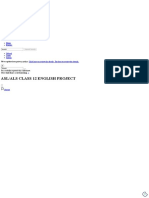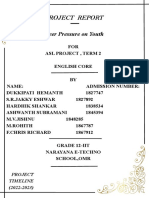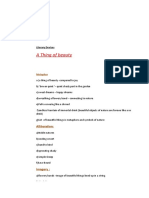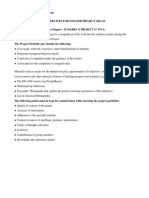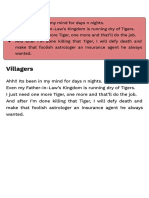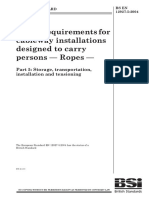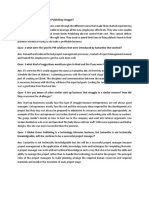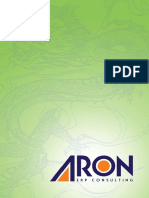100%(8)100% found this document useful (8 votes)
16K viewsEnglish Last Lesson HHW
This document discusses three main topics:
1. The theme of linguistic chauvinism and importance of time management as shown in the story "The Last Lesson".
2. Countries where linguistic chauvinism has occurred, such as Germany imposing German on France and Britain imposing English on India.
3. The importance of mother tongue to cultural identity and unity, as discussed in "The Last Lesson" through the teacher's urging the villagers to preserve their French language.
Uploaded by
yuwanshCopyright
© © All Rights Reserved
We take content rights seriously. If you suspect this is your content, claim it here.
Available Formats
Download as DOCX, PDF, TXT or read online on Scribd
100%(8)100% found this document useful (8 votes)
16K viewsEnglish Last Lesson HHW
This document discusses three main topics:
1. The theme of linguistic chauvinism and importance of time management as shown in the story "The Last Lesson".
2. Countries where linguistic chauvinism has occurred, such as Germany imposing German on France and Britain imposing English on India.
3. The importance of mother tongue to cultural identity and unity, as discussed in "The Last Lesson" through the teacher's urging the villagers to preserve their French language.
Uploaded by
yuwanshCopyright
© © All Rights Reserved
We take content rights seriously. If you suspect this is your content, claim it here.
Available Formats
Download as DOCX, PDF, TXT or read online on Scribd
You are on page 1/ 3
THE LAST LESSON
1.Elaborate the theme of Linguistic Chauvinism and
Procrastination and importance of Time Management.
The theme of the story ‘The Last Lesson’ is linguistic chauvinism
of the proud conquerors and the pain that is inflicted on the
people of a territory by them by taking away the right to study or
speak their own language and thus make them aliens in their own
land of birth. Linguistic chauvinism is a term applied to the
concept of preference for one language over another. In the case
of this story, thematic exploration of linguistic chauvinism
references both the passion expressed by the characters toward
the loss of the French language being taught in school as well as
the oppressive introduction of German as the new official
language of the region in the wake of its annexation as a
negotiation for a peaceful end to the Franco-Prussian War. In the
story when the young student who is the narrator Franz wakes
up, the worst thing in the world to him is having to face his
teacher’s lesson on participles that he neglected to study for. All
he can think all morning until he arrives at school is his anxiety
over failing to study and the trouble, he’s going to get in because
of it. By the end of that very same day, the lesson no longer
matters because the French language is no longer going to be a
subject taught in the school. Overnight, the requirement to learn
to French has disappeared, but ironically Franz’s desire to learn it
has exploded. This tells us the importance of Time management
that is don’t put off learnings or doing things until tomorrow
because the opportunity may be taken from you by then.
2. Collect Data about countries where people have these
tendencies.
2. For over centuries outsiders have tried to invade the other
countries & in doing so they have found that the best way of
manipulating native people's minds against their own country is
to take away their strongest weapon "“their mother tongue. Be it
the Germans imposing German language on the French after
Prussian war or Indians' Hindi language being chained in shackles
by the British, it has always been "language" bearing the bitter
repercussions. In the 1960s, when New Delhi tried to impose
Hindi as the sole official language of the Indian union, non-Hindi
speaking areas vehemently opposed this. Anti-Hindi sentiment
was particularly strong in the Southern state of Tamil Nadu,
where Tamil is spoken. The most chauvinistic attitudes towards
culture were recorded across Eastern Europe with Romania (66
percent), Bulgaria (69 percent) and Russia (also 69 percent) on
top. The highest score of any country across Europe was actually
recorded in Greece where 89 percent of people agreed with the
statement. Papua New Guinea is the most linguistically diverse
country in the world, with approximately 840 languages used.
3. How do they give importance to their Mother Tongue?
Mother tongue can often be referred to as your first language or
native language. It is the language that you most commonly speak.
A person's mother tongue is of great value and importance. It is
the common factor which unites the countrymen. M Hamel made
the villagers realize the importance of the mother tongue. He
spoke about the beauty of their mother tongue – the French
language. According to M. Hamel, even if people are enslaved,
their mother tongue can act like a key to a prison. He believed
that French was the most beautiful and logical language in the
world . Later in the story he expressed his dismay that the whole
population of Alsace was responsible for neglecting their mother
tongue. He called upon them to guard it among themselves and
never forget it. Their language was the key to their unity and
liberation.
You might also like
- Gender, Religion and Caste 10 TH Class PPT and Revision Notes50% (2)Gender, Religion and Caste 10 TH Class PPT and Revision Notes50 pages
- How Does A Man Find Peace and Solidarity in The Lap of Nature100% (2)How Does A Man Find Peace and Solidarity in The Lap of Nature5 pages
- Name-Mritrika Dutta Roll No - 17 Class - Xii Section - G ASSESMENT YEAR-2021-2233% (6)Name-Mritrika Dutta Roll No - 17 Class - Xii Section - G ASSESMENT YEAR-2021-2211 pages
- English Core (301) : Term II Project Portfolio/Project Report Topics List With The Tasks25% (4)English Core (301) : Term II Project Portfolio/Project Report Topics List With The Tasks3 pages
- Mineral Resource and Ore Reserve Estimation PDF100% (4)Mineral Resource and Ore Reserve Estimation PDF902 pages
- Lost Spring: Short Answer Type Questions (2 Marks, 30-40 Words)No ratings yetLost Spring: Short Answer Type Questions (2 Marks, 30-40 Words)2 pages
- The Lost Spring: The Theme of The Chapter Is The Grinding Poverty and The Traditions Which Condemn Poor100% (1)The Lost Spring: The Theme of The Chapter Is The Grinding Poverty and The Traditions Which Condemn Poor4 pages
- Poetic Devices Used in The Poem in Aunt Jennifer's.....100% (6)Poetic Devices Used in The Poem in Aunt Jennifer's.....1 page
- The Enemy From Latest BBC by Yash AgarwalNo ratings yetThe Enemy From Latest BBC by Yash Agarwal39 pages
- Prose 1 - The Third Level - Important QANo ratings yetProse 1 - The Third Level - Important QA4 pages
- Character Sketch of Charley in The Third Level0% (5)Character Sketch of Charley in The Third Level2 pages
- I) The Last Lesson-Freedom of Speech and Expression0% (2)I) The Last Lesson-Freedom of Speech and Expression4 pages
- Class 12th Last Lesson Critical AnalysisNo ratings yetClass 12th Last Lesson Critical Analysis3 pages
- How Did Charley Reach The Third Level of The Grand Central Station?100% (1)How Did Charley Reach The Third Level of The Grand Central Station?3 pages
- Benling India Energy and Technology Pvt. Ltd.No ratings yetBenling India Energy and Technology Pvt. Ltd.1 page
- PE 2 Module 1 Fundamentals of Rhythmic ActivitiesNo ratings yetPE 2 Module 1 Fundamentals of Rhythmic Activities10 pages
- Bocconi Graduate Instructions and Rules 2025-26 ENGNo ratings yetBocconi Graduate Instructions and Rules 2025-26 ENG11 pages
- Grid Automation PPT P741 - 2 - 3 EN 2011 - 02 0001100% (3)Grid Automation PPT P741 - 2 - 3 EN 2011 - 02 000158 pages
- Full Download Plant Protein Secretion Methods and Protocols 2nd Edition Liwen Jiang PDF DOCX100% (7)Full Download Plant Protein Secretion Methods and Protocols 2nd Edition Liwen Jiang PDF DOCX61 pages
- Ethiopia National Fertilizer and Inputs Unit - PDF AbbyyNo ratings yetEthiopia National Fertilizer and Inputs Unit - PDF Abbyy51 pages
- EE1 and ISE1 Communications I: Pier Luigi Dragotti Lecture ThirteenNo ratings yetEE1 and ISE1 Communications I: Pier Luigi Dragotti Lecture Thirteen11 pages
- 12 Object-Is-To-Determine-The-Reduced-Level-Of-Existing-Road-Profile-LevellingNo ratings yet12 Object-Is-To-Determine-The-Reduced-Level-Of-Existing-Road-Profile-Levelling4 pages
- Jacobs Model 349A Engine Brake Installation Manual 18312 1995100% (1)Jacobs Model 349A Engine Brake Installation Manual 18312 199522 pages

























